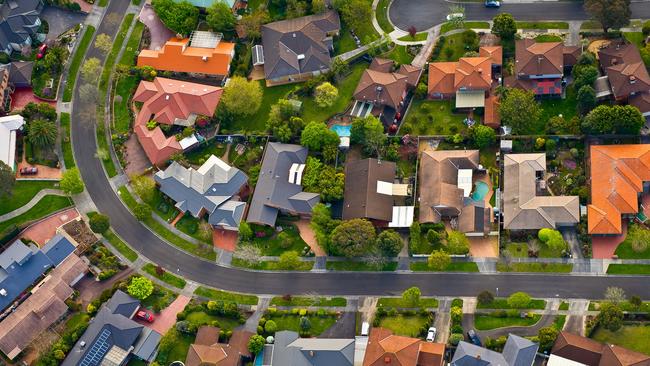Deutsche Bank forecasts house prices to tumble 15 per cent, biggest fall in 50 years
Australia’s housing market is on track for a 15 per cent year-on-year fall, the weakest performance in more than fifty years, says Deutsche Bank.
Australian house prices are set to plunge the most in 50 years as rising interest rates cripple the sector after years of unprecedented growth.
Deutsche Bank Research economist Phil Odonaghoe said house prices fell in May and June and with interest rates set to increase, prices are expected to fall 15 per cent year-on-year by the middle of 2023.
“If our forecasts prove accurate, the middle of next year will see the weakest house price growth recorded in Australia for more than 50 years,” he said.
But he said the trough would still be shallower than the most recent peak for the housing market of +22 per cent year on year growth in the fourth quarter of 2021.
Mr Odonaghoe said the housing market looks to have peaked in the second quarter of 2022, meaning the projected fall from peak to trough was likely to be 15 per cent.

The market was then likely to recover some ground, with Deutsche flagging house price growth of around +5 per cent year on year by the middle of 2024.
Since 1971, there have only been six episodes where Australian nominal house price growth has turned negative in year-ended terms. On average over those six episodes, the low-point was about a quarter as large as the peak.
“The average peak in growth in these six episodes was +12 per cent (year on year), the average trough in growth was just -3 per cent (year on year),” he said.
In good news for the ‘’housing market bulls’, Mr Odonaghoe said periods of negative growth in the Australian housing market were infrequent and also usually short-lived in duration.
“In only 16 of the past 204 quarters has Australian house price growth registered negative year-end growth,” he said.
Mr Odonaghoe said there was a striking correlation between house price growth and auction clearance rates, with clearance rates leading prices by about six months.
“At current levels, auction clearance rates suggest growth will continue to decelerate from +11.2 per cent (year on year) in Q2 to low single digits by the end of the year,” he said.

On an encouraging note, he said clearance rates have been relatively resilient to rising rates, at least so far.
“Recent auction clearance rates in Sydney and Melbourne have been broadly stable in the mid-50 per cent range, albeit well down from the (approximately) 90 per cent peaks seen in March 2021,” he said.
It comes as recent data from released from property researcher PropTrack revealed a fall in housing prices at a national level of -0.25 per cent in June.
Price are now down more than 1.5 per cent from the peaks experienced earlier this year.
Prices in Melbourne fell the most by -0.61 per cent while Sydney followed behind with a fall of -0.40 per cent.
Brisbane experienced its first fall in prices since April 2020 falling by -0.9 per cent becoming the latest capital city to see the end of the housing boom.
Despite regional areas still sitting at a price peak and outperforming capital cities some regional markets declined in June, including regional New South Wales (down 0.02 per cent), regional Victoria (down 0.13 per cent) and regional Western Australia (down 0.80 per cent).
PropTrack economist Paul Ryan said he was surprised to see Brisbane trend downwards so soon in the downturn cycle given its recent strength and relative affordability to the southern markets.
“It signals that buyer sentiment has dropped quite significantly, even in just the last month,” he said.
“It’s fair to say that the higher than expected rate rise from the RBA earlier in the month played a big part.
“That’s increased a lot of people’s, including our own, expectations of how high interest rates will be at the end of the year. So, you can understand why buyers are a little a little more reticent to bid as highly as they have over recent months.”
Economists expect the RBA to hike interest rates again at the monthly board meeting next week.
Mr Odonaghoe is predicting a 50 basis point rise at the meeting next week but says he is more interested in the results of the August meeting.
“ I think the August meeting after we get the Q2 CPI. I think there’s a chance they may do a 75 basis point hike at that meeting but to get a 75 we would have to see a very strong Q2 CPI,” he said.
Mr Odonaghoe expects rates the official cash rate will rise from current 0.85 per cent to reach 3.1 per cent by the end of this year.
“My sense just looking around the rest of the world, the States and Europe in particular inflation in Australia is only going one way and the RBA is going to be surprised about the upside of inflation and wages in the second half of this year and they are going to have to do a lot more hiking,” he said.
“A 3.1 cash rate that’s outright contractionary policy actively leaning against activity rather than supporting it which it has been doing through the pandemic.”
With Mackenzie Scott and Matt Bell






To join the conversation, please log in. Don't have an account? Register
Join the conversation, you are commenting as Logout